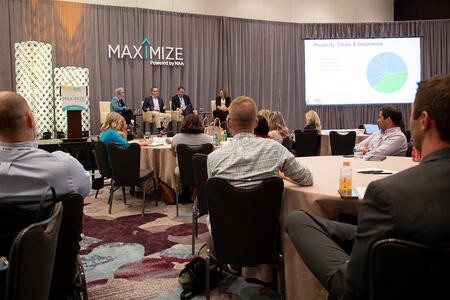Multifamily Blogs
Forewarned is Forearmed: NAA Maximize 2019 in Review
Forewarned is Forearmed: NAA Maximize 2019 in Review
 Lately, we've been writing about the possibility of a downturn, and the impact that it will have on multifamily revenue management. It came as no surprise, then, that the changing economic tides appeared to be a recurring theme at last week's Maximize asset management conference in Atlanta.
Lately, we've been writing about the possibility of a downturn, and the impact that it will have on multifamily revenue management. It came as no surprise, then, that the changing economic tides appeared to be a recurring theme at last week's Maximize asset management conference in Atlanta.Although the conference's audience seemed neither preoccupied nor unduly worried by the prospect of a downturn, it formed a backdrop for the program. From the keynote session where economist Ryan Severino assured us that while a downturn is coming it is not happening tomorrow, to individual sessions in one of which I was fortunate enough to be a panelist, there was a decided focus on preparing for the inevitable downturn whenever it comes.
Why pricing experience matters in a downturn
The conversation throughout the event was instructive: those who had been through a downturn (or more than one) before shared lessons learned. Their experience showed in the grasp of tactics that they would employ from the last recession to get through the next. But for many of the attendees who have known only growth during their multifamily careers, I would categorize a state of blissful ignorance.
Of the younger generation of revenue managers in attendance (anyone who has been in the industry less than 10 years which also means anyone under 30), I spoke with only one who had started making tangible preparations. They had revamped marketing, sharpened their focus on sales, as well as building a sense of community with more resident events - all things which are also useful in a good economy.
I was glad to have the opportunity to take part in a discussion with seasoned revenue management pros, including Trey Lane (of Progress Residential) and Mike Lilly (of Weidner Apartment Homes) called Revenue Management and the Recession. We focused on sharing war stories from the last recession and what we learned as we acquired our battle scars. Topics ranged from how to deal with lower demand to increased skips, concessions and inverted leases.
There were a few key takeaways. First, it's important to have a clear strategy, and the earlier you can start formulating your strategy, the better. Beyond strategy, some tactical steps can boost performance, with amenity reviews being a good example.
It remains surprising that whenever we do an amenity audit for a property, we invariably find significant inconsistencies, even with experienced revenue management practitioners. It's smart to correct these discrepancies before the softening market finds you out!
Additional sessions covered renovations and amenities in appropriate detail. Panelists spoke to the need to be nimble by having a few different possible renovation strategies. The additional flexibility is helpful in changing markets if, for example, the market were to turn and demand for the higher end renovation packages suddenly dries up. They also spoke to one of the downsides of the current growth cycle: a very tight labor market. Planning ahead and subbing this work out rather than attempt to have an in house team may be necessary measures.
Tech priorities and the “hype cycle”
Finally, a word for some of the new technologies that I had been looking forward to hearing more about. One theme that was consistent with our 20 for '20 research was the relatively slow adoption of some of the most cutting-edge technologies in the industry.
The coverage of smart home technology suggested it has still not reached the top of the list of asset management priorities. The industry has work to do in understanding how to underwrite and measure ROI for smart home technology. Although one owner reported exciting advances in its self-show program, few others appeared to be pursuing this key technology as aggressively.
Short-term rentals received a similarly tepid reaction from the audience, with many suggesting that they would consider dipping into this market if there is a downturn. It's a pity this exciting revenue stream remains consigned by so many to "Plan B." More organizations should embrace this and other revenue-enhancing innovations in advance of a potential downturn. It's easier to test and implement new capabilities in times of plenty!


